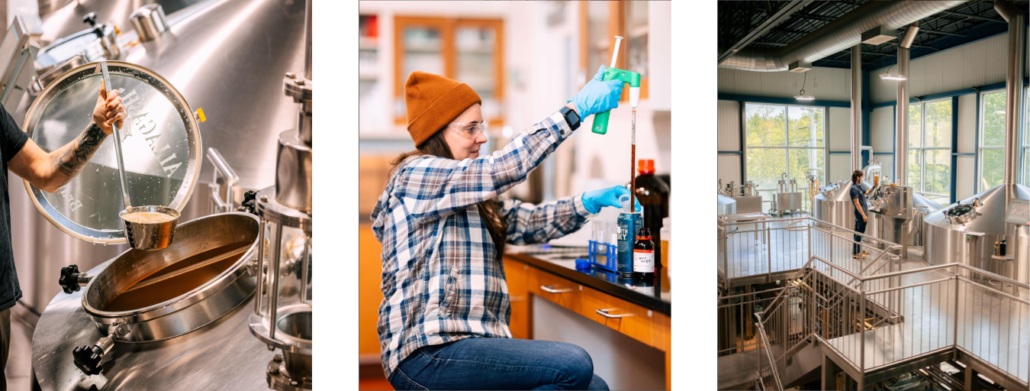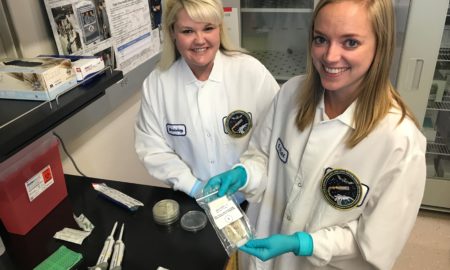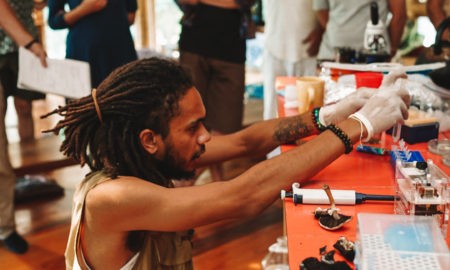Meet a scientist: Michael Billon uses molecular biology tools to brew great beer
Beer fermentation is one of the oldest biotechnologies. There are many strains of yeast used in brewing, and the type of yeast used can affect the beer’s smell, taste, and appearance. Breweries can buy yeast commercially or raise their own, but either way, it is essential to make sure you are using the type of yeast you intend to use.
In today’s interview, we learn about the intersection of molecular biology and the science of brewing beer! Michael Billon is a Quality Control Specialist at Allagash Brewing Company. Allagash is an award-winning brewery located in Portland, Maine, known for its Belgian-inspired beers.

What does your job entail?
I have two main responsibilities at Allagash: to ensure consistent fermentation by growing happy and healthy yeast and to ensure that the beer is free of contamination and will taste as intended throughout its shelf life. The elevator pitch to someone who’s less familiar with a brewery is, “I’m the one who grows the yeast!”
How did you get into brewing science?
My interest in microbiology was sparked by a class in college about the biology of fungi, which I found fascinating. Because of my interest in microbiology, I took a job in a diagnostics department at a research lab. I parlayed the bench skills I gained there into a part-time job at a local brewery. I worked nights and weekends to establish a small lab (think very small, my lab was a converted closet). I immediately enjoyed being in the brewery environment, and when an opportunity opened at Allagash Brewing, I applied.
Why is yeast identification important in brewing?
Because different strains of yeast have different effects on the smell, taste, and appearance of beer, it is important to make sure know what yeast you are using. This can be tricky because most brewing yeast are all the same species, Saccharomyces cerevisiae. You won’t see obvious morphological differences on a plate or under the microscope, and the yeasts all grow under the same conditions and have similar biochemical properties. Most people find out they have a problem with their yeast, like contamination with a different strain, by monitoring fermentation profiles and the finished beer. If you want to be proactive instead of reactive, you have to look at the yeast before you start the fermentation process, and examining the yeast’s DNA is the best way to do this. This allows you to identify if something is wrong with the yeast before it ever goes into a product – giving you the chance to save time, money, and resources.
“Because different strains of yeast have different effects on the smell, taste, and appearance of beer, it is important to make sure know what yeast you are using. […] You won’t see obvious morphological differences on a plate or under the microscope.”
How has Allagash incorporated molecular biology techniques into its operations?
Starting a few years ago, Allagash began investing in additional equipment and developing new molecular assays. Eventually, we started an in-house yeast propagation program, which means we grow our own yeast instead of purchasing them commercially. Our most recent undertaking has been using the GELATO gel electrophoresis system to analyze DNA fingerprints from yeast cultures. This gives us more confidence in the quality and consistency of our yeast propagations.

Why do you think it is important for molecular biology information to be shared openly in the brewing community?
I’ve benefited tremendously from what other people have made publicly available. So, in return, I’ve always tried to pay that forward as much as possible. Effectively, every time we as a team at Allagash discover something that we think is of value or of interest to the greater brewing community, we always attempt to share it. I feel the more the industry is open to sharing, the faster it can grow – especially on the lab and quality control side.
Is there anything else you would like to share with our readers?
With things like gluten testing and low-ABV or non-alcoholic brewing, quality control is an area of the industry that is growing extremely fast. Don’t be afraid to reach out to local breweries if you have skills, knowledge, or interest. There are a lot of full-time and part-time jobs, and internships. It can be a great way to use your skills in a unique way, all while gaining experience.
This interview has been edited for length and clarity.
Related posts:










